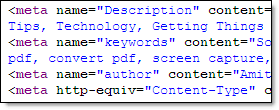 Wondering why your blog or website, which ranks high in Google Search results, is not doing so well in Yahoo Search ? The answer could be in the keywords meta tag on your webpages.
Wondering why your blog or website, which ranks high in Google Search results, is not doing so well in Yahoo Search ? The answer could be in the keywords meta tag on your webpages.While Google spiders absolutely respect the NoIndex, NoFollow or Cache related meta tags, it is more or less agreed in the SEO community that Google won't may any attention to keyword meta tags while calculating search ranking. [Google does read the Description meta tag to show snippets in search results.]
On the other hand, Google's competitor Yahoo strongly advocates the use of description and keywords meta-tags for higher search rankings in Yahoo.
Here are some guidelines from Yahoo! that can help your page be found by a focused search on the Internet:
* Use a "description" meta-tag and write your description accurately and carefully. After the title, the description is the most important draw for users. Make sure the document title and description attract the interest of the user but also fit the content on your site.
* Use a "keyword" meta-tag to list key words for the document. Use a distinct list of keywords that relate to the specific page on your site instead of using one broad set of keywords for every page.
Similarly, MSN also suggests using the Description Meta tag for describing your site content though it doesn't say anything about the use of Keyword metatags.
The safest approach is that you should not ignore the keywords meta tag even if you are receiving a bulk of search traffic from Google. A good ranking in Yahoo! won't hurt but add to your revenues and this involves just adding a new line of HTML code in your blog template.
Another important thing to remember here is to use different keywords on different webpages that match with the page content. Blogspot users may consider splitting their post titles into individual words and construct the meta keywords tag from these words. You can also add some generic keywords as well.
Tips for Ranking High in Image Search